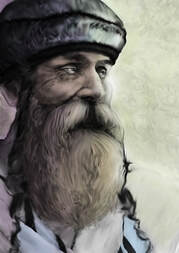 The Lord has taken me through a heavy process lately, comprising three topics. Topic one: Tying up loose ends. Part of this is following through with written works I’d finished or have partially completed in the past and to get them released (another book is coming out in the next few days). I’m tidying up and getting rid of the excess of things of which I have full ownership. An urge has come over me, that if it’s not nailed down, or if it’s surplus to my daily needs/use, it’s gone (not including books or art). This act has hogged my spiritual life as well. I noticed that occasionally a recollection of something I’d said or done in the past—sometimes years past—that I wish I hadn’t would pop into my head. It’d make me cringe with shame or embarrassment, and I’d push it down, away, and go about my business. Out of sight, out of mind means gone, right? Not really. Because it was still there and would keep resurfacing until I dealt with it. The Holy Spirit was bringing it up and again because I needed to repent. I had loose ends needing tied; unfinished business to address, excess to purge. So it came to a place that whenever a cringeworthy memory struck a nerve, I would say, “Oh gosh, Lord, I’m so sorry. Please forgive me. Thank you, my redeemer, for who you are, for forgiving my sin. And now I ask that you forever remove that sin, along with the shame and embarrassment in the memory of it, and throw it all into the sea of forgetfulness. With your holy blood covering, it will never haunt me again. Gone! In Jesus’ mighty name!” I can almost hear a set of hands brushing together after handling something dirty. This was happening a lot, because it was a shedding process. Layers removed that freed me from not just the big things, but itty-bitty things that I had no idea that what I’d flippantly said about this thing, or had done, grieved the Holy Spirit. I wanted to be free of it all. I asked God to do a work in me. If it took an overhaul, go right ahead. I asked for it. Because I wanted less of me and more of him. I want to move forward in his kingdom. So stuff was coming up a lot. I had to make room. Over two specific nights, all night long, I was in what I like to call the “half-state”. This is that place between wakefulness and sleep. To an observer, you’re asleep and aren’t moving, yet your level of awareness is sharp. You can try to call out, but your body doesn’t respond. It used to be the place where demons would torment me; now it’s the place where Yeshua sits with me, and I listen (or I pray while wrestling snakes off of people—but that’s another story or more). Anyway, during these two nights, the Lord sat with me while in the half-state and he brought up one thing after another, and I was in a constant place of repentance for every single thing he wanted me to address. One might think this would be dreadful, and expect to wake up exhausted and feeling terrible. But this was not so. The Lord is so gentle, and kind, and loving, and merciful. As soon as a memory of something came to my conscience, the moment dread filled me over an issue or incident, the Holy Spirit was right there, instantaneously removing it and filling that void with volumes of his holy love and forgiveness—to overflowing! It was both a shedding process and a filling up of the goodness of God. I woke up refreshed and high on the buoyancy of joy! He is so good. Topic two: Making amends. To be free in the Lord is not necessarily to be free in circumstances if you are in a situation that’s choking, difficult, or proves a constant trial. While I believe that if the Lord said to you he’s going to do a thing, deliver you from said situation, then he will. He fulfills his promises. He can change a nation’s position and outlook and deliver. Just look at how he delivered the Israelites from Pharoah. He can do the same for you, because don’t we all have pharaohs in our lives? But what if he hasn’t delivered yet? Or he has and yet you wander the desert for forty years before you are able to cross over to the promised land? Do we hold on to resentment, complain, or keep a string of bitterness in our hearts? Maybe we’ve done a pretty good job forgiving others who have done us wrong, such as a pharaoh in life, yet it’s a constant battle, a daily struggle to push down resentment, or keep bitterness from growing, and it lashes out sometimes. I think of people such as Corrie ten Boom, or Eva Mozes Kor, who had a lot to forgive, having been under the cruel hands and unthinkable conditions during the holocaust. They came to a place of peace, healing, love, and genuine forgiveness toward their perpetrators. My parents were stunning examples to me of having lived under unfair, unjust, cruel conditions, and not allowing it to fester or deepen. They shucked the damage as they could, allowing Yeshua to do his will to help and keep them. Their love and forgiveness toward those who hurt them was a great example for me. Damage is not irreparable. God can take it all and put something remarkable and beautiful in its place. AND YET, I’ve had my own difficulties with coming to forgive the persecutor or pharaoh, if you will, in my life. I’ve exhibited anger and frustration. But my desire is to have a supple, mendable heart with which the Lord can use to help others. So I strive to make amends. And the Lord has been bringing things and people to my awareness that/who I have needed to make amends with. We aren’t to push down resentment (hidden but not gone), but to give it over; release it for good. Which leads me to the next topic. Topic three: Cutting the line. Last night I had a dream where a pharaoh in my life sat on the ground and said, “I owe you an apology. I’m sorry for ___________.” And the blank was filled with an entire issue, a disappointment that has hurt me, that has held me back; had become a hindrance without my understanding that it was a hindrance. I thought I’d forgiven, yet here it was before me last night. And I said, “That makes all the difference. I forgive you.” And it wasn’t that the pharaoh in the situation (for lack of a better way to call this) in waking life had apologized or ever would. I realized you can’t expect apologies from people even if they’re deserved. Again, look at survivors of genocide who have found the path of freedom to forgive. We can’t control or change people (or the spirits within or beasts that drive them). We can pray, but their conviction comes only from the Holy Spirit. We are accountable for our own reaction, our response. In my dream, Yeshua, the Waymaker, became the one sitting on the ground. Not the one who apologized, but the One who now sat in pharaoh’s place, so to speak, and said, “Will you forgive? Will you do this for me?” And this is when I said “Yes.” The Lord made all the difference. And when I forgave, I saw in my spirit what was like a blimp or a hot-air balloon. It had been tethered down. And all the tethers had been released, except for one. The airship was so buoyant and ready to fly, but this caused that one remaining line to get so taut, pressure so tense, that it couldn’t be released. There was no give or slack in order to do so. I had to sever the last line in order to let the thing fly. Cut the line, the remaining little or big thing you hang onto, that you think you need to keep because someone’s hurt you and owes you an apology, or you have a single strand of resentment or bitterness hidden deep in your heart. May your prayer be, “Search me, O God, and know my heart! Try me and know my thoughts! And see if there be any grievous way in me, and lead me in the way everlasting!” (Psalm 139:23-24) Cut that line, and fly the way you’re meant to fly. Weighty topics for sure. Yet the love language from the Lord has been sweet. A few incidents I felt compelled to share, and so I wrote updates at the end of a couple of blog posts I did last month (June 10 and June 15) because they’re connected. Check them out if you have a chance. https://www.tessastockton.com/blogette/somewhere-between https://www.tessastockton.com/blogette/somewhere-within Peace 🕊️  Love is patient; it is kind. If what you have is neither patient nor kind, it is not love. It is something else. Love does not envy, it does not boast, it is not proud. If what you experience envies, boasts, and is proudful, such competitiveness in all its shallow forms is not love. It is something else. Love does not dishonor others, it is not self-seeking, it is not easily angered, it keeps no record of wrongs. If what you endure is critical, selfish, rash, begrudging, disrespectful or devalues your worth or honor, it is not love. It is something else. Love does not delight in evil but rejoices in truth. The truth is found in the Lord Jesus alone and must be held in the highest esteem. Pray with concern for one another to build each other up. Pray with each other. This is love, not something else. Love protects, always trusts, always hopes, always perseveres. So support and encourage one another. Have each other’s backs at all times. This is love, not something else. If you’re looking for love, witness the traits to build upon. If these characteristics are missing, then it’s not love. It’s something else. Love is not a feeling, infatuation, attraction, even a connection. Love is a distinguishing trait of the godly. A quality of the righteous, and an integral ingredient for any kind of relationship. A bond outside of this kind of love presents structural holes, even gaping ones. Make Jesus your first love, the lover of your soul, to fill you up with his agape love that bears all things, believes all things, hopes all things, and endures all things… HIS perfect love makes us whole.  Seldom mentioned, the book not often read, you might find Jude making the top-ten list for the least popular books of the Bible. More of a letter, Jude’s inspired words tend to stay hidden. Perhaps this is because it’s found before the last humdinger, Book of Revelation. The end times prophecies enthrall many people. The book of Jude, though, is no less significant. In fact, it’s a pertinent call-to-action before the end, and so relevant for right now. The other morning when I’d asked the Holy Spirit which scripture he’d like me to read, he told me, “Jude, Chapter 1.” This gave me a chuckle, because Jude has only one chapter. Way to be specific! Anyway, I’ve been soaking in the words since. Jude paints an unattractive picture of the faithless, disobedient, and wicked. By providing three examples in his past, he gives an unpleasant warning to the people of his present. In our reading his words from roughly A.D. 66-80, he’s providing a message for OUR today. Jude admonishes us to take heed of those who would say forgiveness allows us to live immoral lives. When we seek personal gratification and/or allow the opinion and persuasion of mankind and influence of mainstream to dictate over the opinion, persuasion and influence of God. Woe to those who would succumb to accommodating, allowing and accepting certain patterns and pressures, and compromising the faith by celebrating certain things or movements that, well, shouldn’t be. Not if we’re to uphold the truth. He reminds us of Egypt, when God rescued the nation of Israel, but destroyed those who didn’t remain faithful; fallen angels, who rebelled against God’s authority and were ousted into prisons of darkness until the day of judgment; Sodom and Gomorrah, destroyed for its practice of sodomy and other acts of sexual immorality, perversion—and what our unchanging God still calls unnatural and wicked. Jude also gives examples of woe for like that in Cain, who killed his brother; Balaam, doing anything for money; and Korah, rebelling against God-appointed leaders. The idea of forgiveness, even in some of the church today, has seeped in with a faux glittery package that says we can identify as and be whoever we want and live however we want and God loves us no matter what. Aren’t we special! Well, yes, God loves us. But he loves us so much, he calls us out of sin. Because our society, and the prevalent way of thinking, is wrong, about a lot of stuff, when compared to the Bible. Forgiveness first means repentance. Sincere regret, when we call on God our Father, is replaced with mercy and compassion (because we are special, the apple of his eye). And we’re in the fold, into his kingdom, just like that. So very simple, because Christ bore our sins and grace is a gift that reaches the deepest depths for us. True repentance gifts us with eternal life. What’s most humanly difficult is wading through the gravity of our centuries of pervasive sin. We (mankind through Adam and Eve) had it pretty good once. God created this perfect paradise in the Garden of Eden, and we had freedom and wholeness from sickness, disease, destruction, confusion, chaos, hatred, dissension, division, yada yada yada. Most of all, we had the privilege and pleasure of being in constant, beautiful, fluid communion with the One who created us! We had peace and unequivocal acceptance. By our choice, through temptation that has since wreaked havoc on our souls, man fell away from God, separated and banned from the Garden. Now here we are today, born into that same sin, feeling like gravity, difficult to wade through the effects on our bodies and psyches… but not impossible. Because of God’s love for us, and his great patience, waiting and hoping, and reaching, and extending the ultimate sole path (Jesus) for us to rejoin him. What’s distinct is the favor and knowledge of God. What’s key is our everlasting survival. We are to protect the truth of the Gospel against a culture that would seek to twist, corrupt, or compromise the truth in the name of tolerance or acceptance. Indeed, with a heart of compassion, we are to reach out to our brothers and sisters and help hurting people, whether it be from abuse, identity crisis, rejection, perversion, prostitution, slavery, addiction—literally everything. But none of us are meant to stay where we are. We’re to come out of sin and away from a lifestyle of sin. And to support each other out of it. Our identity is in Christ alone. We reject whatever is keeping us from being holy—for we are called to be holy. The world is dark and getting darker. He’s calling us higher, closer; to be a beacon on a hill, a lighthouse in the night season, to spend more time in his presence. It takes a daily renewal and commitment. Jude’s message today would be unacceptable in many circles of our current culture. If he were living right now among us, he’d be called something like a hater, rude, or intolerant. But what he does in a 25-verse chapter is admonish those in the faith to fight for the faith. For the love of his neighbors, for the love of God, he takes a sad song and makes it better. We’re to study The Word, build each other up, pray in the Holy Spirit—not asking for selfish gain but to know him better. And if you don’t know how to do that, how to listen and hear from God, how to even start… It’s sort of like learning a foreign language. You’ve been given the free-kit or app, so to speak. When you first start studying a language, little makes sense. But as you listen, read, practice, spend time in it… the more you immerse yourself in it, the more you understand, the more fluent you become. Be fluent in the Gospel. The Word of God is where you find the only pure and unadulterated truth; and unblemished and perfect love. Little known Jude packs a punch, but it is Good News. Why not start there? And from there, perhaps, Psalm 32 (The Joy of Forgiveness). With love, Tessa  It was testimony-night at the small church. The roster of individuals who wanted to share grew as the evening progressed. Testimonies such as an addict who’d overcome his addiction overnight and has now remained drug free for over five years. A woman diagnosed with a brain tumor the size of a golf ball went in for more testing when the doctors, without medical explanation, discovered the tumor had disappeared. The reuniting of a praying parent and a prodigal child who found the Lord. Profound testimonies to the glory of God! And then there were these demonstrations, the ones that confounded me. Their surrender to the Lord brought tears. An act of love, of letting go of their own desires. Of saying, “Not my will, but thine Lord Jesus!” A man in a wheelchair who the Lord spoke to promising he’d walk again. Twelve years had passed since the accident, and yet he still rolled rather than walked. The Lord helped him through discouragement and taught him how to wait with patience and hope. He has peace in the waiting. A woman who had a slew of afflictions, one after the other, and toxic relationships, and she’d learned to manage her life better and make better choices with diet and lifestyle. She witnessed you can’t always control every circumstance or even people, but you can control your response or reaction. Be faithful in the things you can control, beginning with the choices you can make right now. Another woman presented like a modern-day Job. Her house flooded, then it burned down; she lost her job, got divorced from an abusive man, went bankrupt, survived cancer, lost one of her children... What could she possibly be grateful for? And yet she was exuberant with divine joy. The one most memorable for me was of a middle-aged man who’d lived a hard and promiscuous life. He’d contracted an STD and learned to live with it (also to speak frankly about it, which took admirable courage). Had once known the Lord, but wandered astray through temptations of the flesh in a hard-to-flee-from environment. When he returned and got anchored in the faith, he’d begged God to heal him of his disease so he could marry a godly woman. He determined he couldn’t marry until God healed him, as he wanted to present himself to the woman God had for him without the shame he carried, explaining that each flare-up was like a knife-stab reminder of the poor choices of his past. He also didn’t want to pass that on. God hadn’t healed him, and yet there he was, standing side-by-side with a godly woman, his wife, her hand on his arm. She was a pure soul. Hadn’t had the background or experience he’d had; truly an innocent. Yet there she was, devoted, adoring, selfless to him. She knew of his condition, of the risks, and she married him anyway. For the Lord called her—called them together. In fact, they were moving into full-time ministry together. Some might hear that, and if they were in her shoes, think, “Ew, not for me.” But I was really struck by the beauty of it. Still am. So many distinct stories, conditions, situations and outcomes, and yet one common theme ran among all of them. Gratefulness for what he’s done. He forgives our sins, makes us citizens of Heaven, giving us our true home, of belonging, unconditional love, a future, a destiny, a purpose. Sometimes he heals us; sometimes he promises to heal us and waits with us until that perfectly timed fruition, and sometimes he chooses not to heal us. And when it’s the latter, he helps us to manage our lives in him—and also can still bring us unexpected blessings from Heaven. He moves often in ways we haven’t considered. Keeps us surprised and delighted. The point is, he’s always there. When we can lay everything down, let go of our own wishes and expectations, and press in to him… that’s when he fills us and makes us whole. When our spirits are whole, we are whole… no matter what our bodies or circumstances are doing. I love a good story of healing or deliverance. But I admit, it’s that last one, where healing wasn’t necessarily a physical one, yet the love and devotion demonstrated through that couple’s testimony, their marriage and ministry-calling is the one that moved me to write this blog post. Baruch HaShem  A return of my Hearts in Africa series is here with installment #3 in a four-book sequence. Can also be read as a standalone. I’d written and completed this book years ago. Advice from an earlier publisher I had contracted with, to drop the romances and focus on their forte of suspense and thriller, had me file the manuscript away. I thought for good. But I’ve determined recently to resurrect this novel, along with others I’d completed and/or started yet never launched. In hindsight, I should have published this work back then and in order. Not that the advice given to me was off beam. I understand the marketing incentive, and also avoiding possibly polarizing my readers. The focus on one style or genre works well and for many people. However, I’ve felt hemmed in when I’m inspired to create in a variety of genres and voices (even POVs) yet have believed I can’t or shouldn't. I started wondering why I have to stick to a specific style. If God plants ideas and inspirations in your heart and soul, they need to be able to grow; not kept buried underground. Sometimes it’s a timing issue; sometimes it’s a choice. Maybe sometimes it’s both. Be faithful in the things over which you can choose. I’ve not allowed some of my works to grow much. If I’m compelled to write, finish, and edit a book, I ought to bring it to completion and release it, too--even if it's ten years later (knock on wood). Maybe that book is not for everybody, but it’s for somebody. So I’m following through by reassessing my stash of romance titles and more. Still working on my latest speculative fiction books, as well. They’ll all make their way down the pike, by God’s grace. If you’ve held back on some once-upon-a-time creative pursuit, maybe it’s your time to take another look at the possibilities, too. Without further ado, please welcome, Return My Heart, made available at online bookstores worldwide. If you don’t see your favorite bookstore listed after you click the button below, my distributor is working on it. The launch is that fresh. More outlets are being added each day, so be sure to check back. About the story: Lorelei moved to Kenya when she married Hugh Berrand, an animal behavioral scientist at Tsavo West National Park. After a year of marriage, she feels abandoned when she takes a backseat to her husband’s first passion, the maneless lions. Rejected by the field’s family of researchers, she suffers from loneliness and discord, especially when her husband is never there to support or defend her. After Lorelei is assaulted and left for dead at Shetani, the devil’s lava, she struggles to put the pieces of her existence back together; namely, the fragments of her fragile marriage. But her effort proves futile with a man who seems to prefer an independent lifestyle. When an unwanted child enters the equation, the Berrand’s separate. Each tries to rebuild life from broken strands apart from each other. However, God has something else in mind and works on the hearts of Lorelei and Hugh for restoration and love anew. Love, adventure, tragedy, redemption—all is at stake in the inspirational romance series, Hearts in Africa. ~~~~~~~~~~~~~~~~~~
|
Tessais a storyteller, and a transcript editor. She's also a Romans 8:28 kind of Jewish girl ... For Tessa's new
|





 RSS Feed
RSS Feed